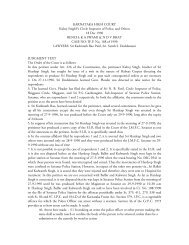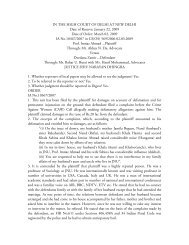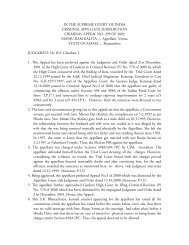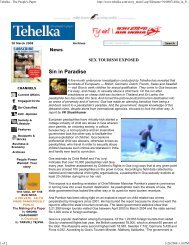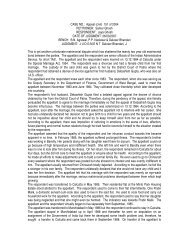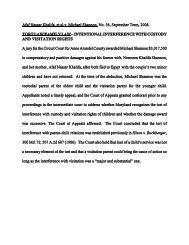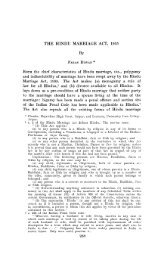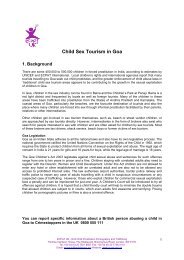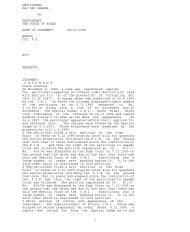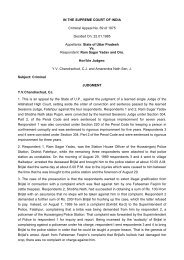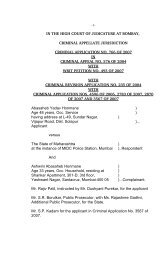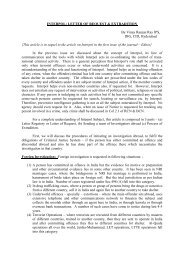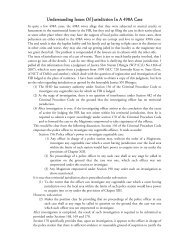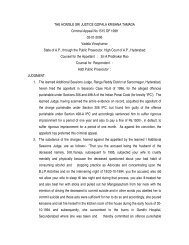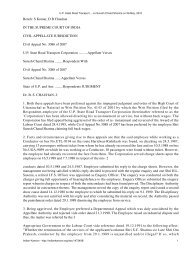AP HC Quotes Dowry Prohibition Act In Judgment: 2005 - IPC 498A
AP HC Quotes Dowry Prohibition Act In Judgment: 2005 - IPC 498A
AP HC Quotes Dowry Prohibition Act In Judgment: 2005 - IPC 498A
Create successful ePaper yourself
Turn your PDF publications into a flip-book with our unique Google optimized e-Paper software.
Since Sections 417, 418 and 420 relate to cheating, in one form or the other, it<br />
is necessary to note the ingredients of "cheating" in Section 415 I.P.C, which<br />
are:-<br />
(1) deception of any person;<br />
(2)(a) Fraudulently or dishonestly inducing that person (i) to deliver property<br />
to any person; or (ii) to consent that any person shall retain any property ; or<br />
(b) intentionally inducing that person to do or omit to do anything which he<br />
would not do or omit to do if he were not so deceived;<br />
and which act of omission causes or is likely to cause damage or harm to that<br />
person in body, mind, reputation or property.<br />
The definition of cheating contains two classes of acts which the person<br />
deceived may be induced to do. Firstly he may be induced fraudulently or<br />
dishonestly to deliver any property to any person or to consent that any person<br />
shall retain any property. The second class of acts is the doing or omitting to<br />
do anything which the person deceived would not do or omit to do if he/she were<br />
not so deceived. <strong>In</strong> the first class of acts, the inducement must be fraudulent<br />
or dishonest and in the second class of acts it must be intentional but not<br />
fraudulent or dishonest. "Deceiving" means causing to believe what is false or<br />
misleading as to a matter of fact or leading into error. Whenever a person<br />
fraudulently represents as an existing fact, that which is not an existing fact,<br />
he commits deception. The person cheated must have been intentionally induced<br />
to do an act which he would not have done, but for the deception practiced on<br />
him. The intention at the time of the offence and the consequence of the act or<br />
omission has to be considered. The damage which is caused by the act or<br />
omission must be direct, natural or a probable consequence of the induced act.<br />
The person deceived must have acted under the influence of the deceit. It is<br />
necessary that harm should be caused to the person deceived.<br />
The allegations in the complaint, in relation to "cheating" under Sections 417,<br />
418 and 420 I.P.C, are that the accused had cheated the complainant with the<br />
knowledge that they were using her money, influence and position in the U.S.A<br />
for their gain, causing wrongful loss to the complainant in every aspect of her<br />
life. Accepting as true the allegations that the intention of the accused was<br />
that the 1st accused should use his marriage, with the complainant, to go to the<br />
USA and to make them part with their money towards his studies, stay in the USA<br />
and as dowry, in effect, the complainant and her parents were induced to do<br />
something which they would not have done had they not been so deceived. It<br />
cannot, therefore, be said that the ingredients of 'cheating' are not attracted,<br />
even prima facie.<br />
It is not every harassment or every type of cruelty that would attract<br />
Section 498-A I.P.C. The complainant must allege that the harassment in<br />
question was with the intention to force her to commit suicide or to fulfill<br />
illegal demands of dowry. It is only when the harassment is shown to have been<br />
caused for the purpose of coercing a woman to meet such demands does it amount<br />
to cruelty which is made punishable under Section 498-A I.P.C. Cruelty<br />
postulates such harassment as to cause a reasonable apprehension in the mind of<br />
the wife that her living with her husband would be harmful and injurious to



